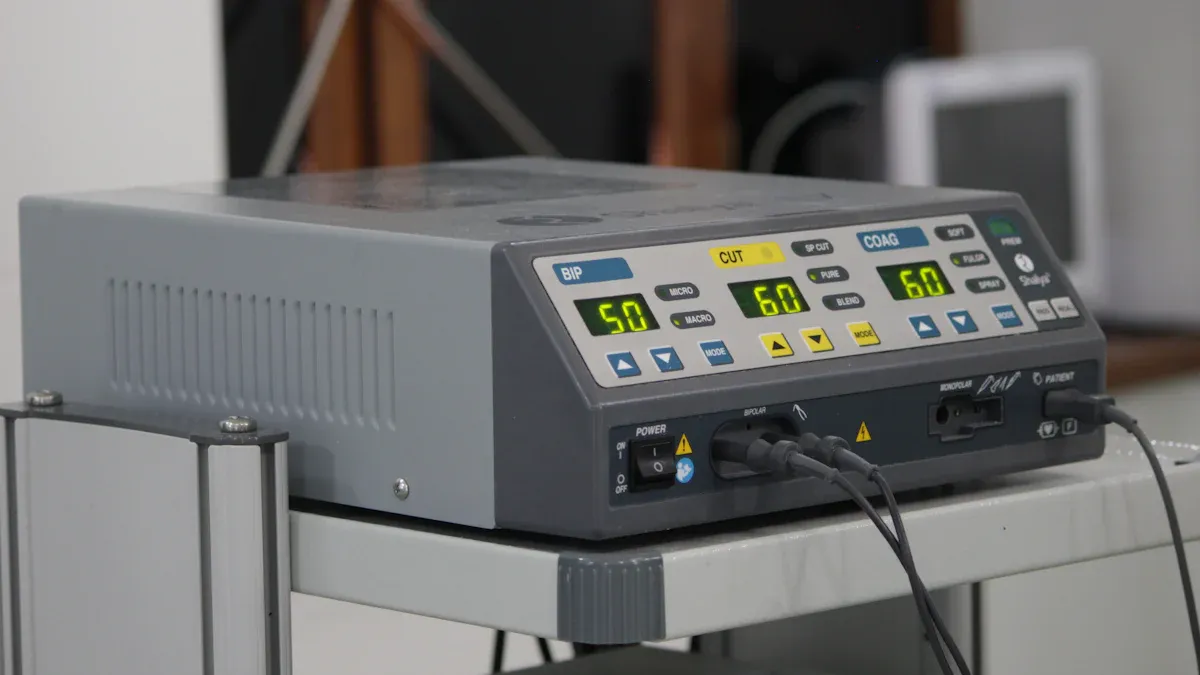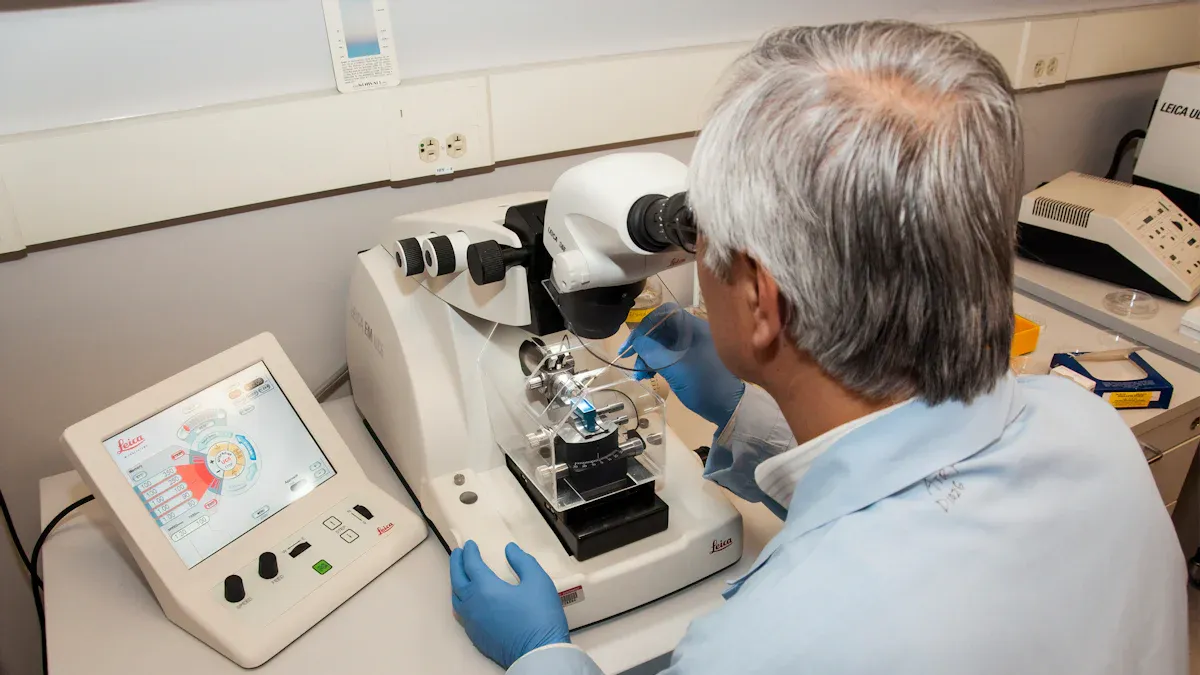Exploring the Applications of Nitinol Tubing in Healthcare Devices

Medical nitinol tubing plays a pivotal role in modern healthcare by enabling the development of advanced devices for diagnostics and treatment. This specialized tubing, crafted from a nickel-titanium alloy, exhibits remarkable properties such as shape memory and superelasticity. These characteristics allow nitinol to return to its original form after deformation, making it ideal for applications requiring precision and flexibility.
The material's high fatigue resistance further enhances its suitability for long-term use in cardiovascular devices. Studies reveal that tubing manufactured using TM-1 techniques demonstrates fatigue endurance limits up to three times higher than TM-2 tubing at 107 cycles. This durability ensures reliable performance in demanding environments, such as minimally invasive procedures. Additionally, nitinol's biocompatibility and corrosion resistance make it a trusted choice for implants and surgical tools.
AccuPath's medical nitinol tubing exemplifies these qualities, offering healthcare professionals innovative solutions for improving patient outcomes.
Key Takeaways
Nitinol tubing can return to its shape and bend easily. This makes it great for medical tools that need to adjust quickly.
It lasts a long time without breaking, making it safe for devices used over many years.
Nitinol is safe for the body and does not rust. This makes it perfect for implants that stay inside people.
Special ways of making nitinol, like polishing, make it work better in important medical tools.
New uses in wearable devices show nitinol is very bendable. It helps create tools that are comfy and track health better.
Unique Properties of Medical Nitinol Tubing

Shape Memory and Superelasticity
Medical-grade nitinol exhibits two defining characteristics: shape memory and superelasticity. Shape memory allows nitinol to return to its original form after deformation, making it ideal for applications requiring precision and adaptability. Superelasticity enables the material to withstand significant strain without permanent deformation, ensuring reliable performance in dynamic environments. These properties are particularly valuable in cardiovascular devices, such as stents and guidewires, where flexibility and resilience are critical.
AccuPath's nitinol tubing leverages these unique traits to deliver superior functionality in medical devices. Its consistent quality ensures predictable behavior under stress, enhancing the reliability of minimally invasive procedures.
Biocompatibility and Corrosion Resistance
Nitinol's biocompatibility makes it a trusted choice for implants and long-term medical applications. The material interacts safely with human tissues, minimizing adverse reactions. Additionally, its corrosion resistance ensures durability in challenging environments, such as the human body, where exposure to fluids and varying pH levels is constant.
Recent studies highlight the importance of surface finish in enhancing corrosion resistance. For example, electropolished nitinol tubing demonstrates breakdown potentials of up to 1000 mV, significantly outperforming oxidized tubing. This underscores the importance of advanced manufacturing techniques in producing medical-grade nitinol tubing. AccuPath employs cutting-edge processes to optimize surface finishes, ensuring both biocompatibility and corrosion resistance in its products.
Surface Finish | Breakdown Potential (mV) |
|---|---|
Oxidized Tubing | -117 |
Electropolished (EP) | Up to 1000 |
High Fatigue Resistance for Long-Term Use
Medical nitinol tubing is renowned for its high fatigue resistance, a critical factor in long-term applications. Research reveals that the fatigue life of nitinol tubing depends on factors such as processing techniques and material cleanliness. Smaller inclusions and voids enhance fatigue performance, making nitinol tubing suitable for demanding medical environments.
AccuPath's nitinol tubing exemplifies this durability. By employing advanced manufacturing methods, the company minimizes non-metallic inclusions and optimizes tube processing. This results in tubing with superior fatigue resistance, ensuring reliable performance in applications like cardiovascular implants and surgical tools.
Tip: High fatigue resistance in nitinol tubing reduces the risk of device failure, improving patient outcomes and extending the lifespan of medical devices.
Manufacturing Process of Nitinol Tubing
Material Composition and Alloying
The manufacturing process of nitinol tubing begins with precise control over the material composition. Nitinol, a nickel-titanium alloy, requires a balanced ratio of nickel (approximately 55%) and titanium to achieve its unique properties. Material preparation involves melting, hot rolling, cold working, and heat treatment to refine the alloy's structure. These steps ensure the tubing meets the stringent demands of medical applications, such as shape memory and superelasticity.
AccuPath employs advanced alloying techniques to produce high-quality nitinol tubing. By maintaining strict control over oxygen and carbon content during the melt, the company minimizes inclusions that could compromise fatigue strength. This meticulous approach ensures the tubing's reliability in critical healthcare devices.
Process Stage | Description |
|---|---|
Material Preparation | Melting, hot rolling, cold working, and heat treatment to refine the alloy. |
Laser Cutting and Machining | Precision shaping of nitinol components for medical applications. |
Tube Fabrication and Gun Drilling
Fabricating nitinol tubing involves specialized techniques to achieve the desired dimensions and surface quality. Gun drilling, a key step, creates precise internal diameters while maintaining material cleanliness. Surface finishing, such as electropolishing, removes defects and enhances corrosion resistance. This process results in a smooth surface, similar to that of typical nitinol implants.
AccuPath's fabrication methods prioritize quality control at every stage. By ensuring high material cleanliness and controlling surface finishes, the company produces tubing that meets rigorous medical standards. These measures enhance the tubing's performance in applications like stents and catheters.
Indicator | Description |
|---|---|
Material Cleanliness | Maintains high-quality surfaces throughout processing. |
Surface Finishing | Electropolishing removes defects, achieving implant-grade surfaces. |
Quality Control | Controls oxygen and carbon content to avoid inclusions affecting fatigue. |
Heat Treatment and Shape Setting
Heat treatment is a critical step in the production of nitinol tubing. This process establishes the material's mechanical properties and transformation temperatures, which are essential for its shape memory and superelastic characteristics. Annealing, performed at temperatures between 450°C and 600°C, sets the tubing's final shape. Aging, conducted at 300°C to 500°C, fine-tunes its transition temperature and mechanical properties.
Shape setting involves using specialized fixtures to lock the tubing into its desired form. This step ensures the tubing retains its shape even after deformation, making it ideal for applications like cardiovascular stents. AccuPath's heat treatment processes optimize these parameters, delivering tubing with consistent performance and reliability.
Process | Temperature Range (°C) | Description |
|---|---|---|
Annealing | 450-600 | Sets the final shape of nitinol tubing. |
Aging | 300-500 | Fine-tunes transition temperature and mechanical properties. |
Shape Setting | N/A | Uses fixtures to retain designed form after deformation. |
Superelastic Processing | N/A | Enhances energy absorption and shape recovery for flexible applications. |
Note: AccuPath's expertise in heat treatment and shape setting ensures its nitinol tubing meets the highest standards for medical applications, offering unmatched reliability and performance.
Quality Control for Medical Standards
Quality control plays a vital role in ensuring that nitinol tubing meets the stringent requirements of medical applications. Manufacturers implement rigorous procedures to guarantee the tubing's safety, reliability, and performance. These measures address every stage of production, from material preparation to final inspection.
Heat treatment is a critical quality control step. This process refines the tubing's mechanical properties and ensures consistent shape memory and superelasticity. Surface finishing techniques, such as electropolishing, enhance the tubing's corrosion resistance and biocompatibility. These methods remove surface imperfections, reducing the risk of device failure in medical environments.
Tensile testing evaluates the tubing's strength and ductility. By applying strain until failure, this test ensures the material can withstand the stresses of medical use. Comprehensive inspections, including visual checks and advanced imaging, identify defects that could compromise performance. Dimensional measurements verify that the tubing meets precise specifications required for medical devices.
Quality Control Procedure | Description |
|---|---|
Heat Treatment | A process that alters the physical and sometimes chemical properties of nitinol tubing. |
Surface Finishing | Techniques used to improve the surface quality of nitinol, ensuring safety and reliability. |
Tensile Testing | Tests that measure the strength and ductility of nitinol by applying strain and pulling to failure. |
Comprehensive Inspection | Includes visual checks, dimensional measurements, and advanced imaging to identify defects. |
AccuPath excels in maintaining these high standards. The company employs advanced quality control techniques to produce nitinol tubing that meets or exceeds medical industry requirements. By prioritizing precision and reliability, AccuPath ensures its tubing performs flawlessly in critical healthcare applications. This commitment to excellence makes AccuPath a trusted partner for medical device manufacturers worldwide.
Note: High-quality nitinol tubing reduces the risk of device failure, enhancing patient safety and improving healthcare outcomes.
Applications of Nitinol in Medical Devices

Cardiovascular Devices
Stents
Nitinol stents have revolutionized cardiovascular care by offering unmatched adaptability and resilience. These stents can compress for insertion and expand to their original size once deployed, ensuring precise placement and effective treatment of vascular conditions. The superelasticity of nitinol allows these devices to conform to the dynamic movements of blood vessels, reducing the risk of complications. Furthermore, their biocompatibility minimizes adverse reactions, making them ideal for long-term use. AccuPath's nitinol tubing is engineered to meet the stringent demands of stent manufacturing, ensuring consistent performance and reliability in critical applications.
Guidewires
Guidewires made from nitinol enhance the precision and efficiency of minimally invasive procedures. Their flexibility and high tensile strength allow them to navigate complex anatomical pathways with ease, reducing procedural risks. These devices also exhibit exceptional durability, ensuring consistent performance during repeated use. Nitinol guidewires have become indispensable tools in cardiovascular interventions, improving patient outcomes and shortening recovery times. AccuPath's advanced manufacturing techniques ensure that its nitinol tubing delivers the quality and reliability required for these essential medical devices.
Minimally Invasive Surgical Tools
Catheters
Nitinol's unique properties make it an excellent material for catheters used in minimally invasive surgeries. Its shape memory and superelasticity enable catheters to adapt to intricate anatomical structures, enhancing precision and reducing procedural errors. The material's durability ensures consistent performance, even in challenging environments. Nitinol catheters also support catheter delivery systems, improving control and flexibility during delicate interventions. AccuPath's nitinol tubing provides the high-quality foundation needed for manufacturing catheters that meet the rigorous demands of modern medical procedures.
Endoscopic Instruments
Endoscopic instruments benefit significantly from the integration of nitinol tubing. The material's flexibility and pushability enhance control during complex procedures, allowing surgeons to perform with greater accuracy. Nitinol's biocompatibility ensures safe interaction with human tissues, reducing the risk of complications. These instruments are essential for minimally invasive techniques, offering improved clinical outcomes and shorter recovery times for patients. AccuPath's nitinol tubing is designed to support the development of advanced endoscopic tools, ensuring superior performance and reliability.
Orthopedic and Dental Applications
Bone Anchors
Nitinol bone anchors provide exceptional strength and fatigue resistance, making them ideal for orthopedic applications. These devices can withstand repeated mechanical stress, ensuring reliable performance over extended periods. Their biocompatibility minimizes the risk of adverse reactions, supporting safer long-term use. Nitinol's shape memory properties also enhance surgical precision, allowing bone anchors to adapt to the surrounding anatomy. AccuPath's nitinol tubing offers the durability and quality required for manufacturing bone anchors that meet the highest medical standards.
Orthodontic Wires
Orthodontic wires made from nitinol have transformed dental care by offering superior flexibility and resilience. These wires can return to their original shape after deformation, applying consistent pressure to teeth for effective alignment. Nitinol's high tensile strength ensures the wires maintain their functionality over time, reducing the need for frequent adjustments. The material's biocompatibility further enhances patient comfort and safety. AccuPath's nitinol tubing provides the foundation for producing orthodontic wires that deliver reliable and predictable results.
Tip: The global market for nitinol medical devices is projected to grow significantly, driven by advancements in technology and a preference for minimally invasive procedures. AccuPath's nitinol tubing is at the forefront of this innovation, offering solutions that improve patient outcomes and support the development of cutting-edge medical devices.
Case Studies and Research on Nitinol in Medical Devices
Clinical Success Stories in Cardiovascular Treatments
Nitinol-based devices have transformed cardiovascular treatments, offering innovative solutions for complex medical challenges. One notable success story involves nitinol stents used in treating coronary artery disease. These stents, designed with shape memory and superelasticity, adapt seamlessly to the dynamic environment of blood vessels. Clinical trials have demonstrated their ability to reduce restenosis rates, improving long-term patient outcomes. Additionally, nitinol guidewires have enhanced the precision of minimally invasive procedures, enabling physicians to navigate intricate vascular pathways with ease. AccuPath's nitinol tubing plays a pivotal role in manufacturing these devices, ensuring consistent quality and reliability.
Research on Long-Term Biocompatibility
Extensive research underscores nitinol's biocompatibility, a critical factor for long-term medical applications. Studies reveal that nitinol interacts safely with human tissues, minimizing the risk of adverse reactions. Surface treatments, such as electropolishing, further enhance its compatibility by reducing nickel ion release. This makes nitinol an ideal material for implants and other devices requiring prolonged contact with the body. Researchers have also highlighted its corrosion resistance, which ensures durability in challenging environments. AccuPath's advanced manufacturing processes optimize these properties, producing nitinol tubing that meets stringent medical standards.
Innovations in Minimally Invasive Surgery
Recent advancements in minimally invasive surgery have leveraged nitinol's unique properties to improve device performance. Shape memory enhances the accuracy of device deployment, while superelasticity allows instruments to navigate complex anatomical pathways effectively. Biocompatibility ensures safe interaction with tissues, reducing complications. Corrosion resistance contributes to the longevity of surgical tools, supporting better patient outcomes. The table below summarizes these innovations:
Innovation | Description |
|---|---|
Shape Memory | Nitinol's ability to return to its original form enhances device accuracy. |
Superelasticity | Maintains flexibility under stress, aiding navigation in complex pathways. |
Biocompatibility | Ensures safe interaction with the body, improving patient safety. |
Corrosion Resistance | Enhances device longevity, supporting long-term medical applications. |
AccuPath's nitinol tubing supports these advancements by providing high-quality materials for surgical tools. Its precision and reliability make it a trusted choice for developing cutting-edge medical devices.
Future Trends in Medical Nitinol Tubing
Advances in Manufacturing Techniques
Innovations in manufacturing techniques are shaping the future of nitinol tubing. Precision laser cutting and advanced machining methods are enabling the production of tubing with tighter tolerances and smoother surfaces. These improvements enhance device performance and reliability in critical medical applications. Manufacturers are also exploring additive manufacturing, such as 3D printing, to create complex nitinol structures that were previously unattainable.
AccuPath remains at the forefront of these advancements. The company employs cutting-edge processes to refine material composition and optimize surface finishes. Its commitment to innovation ensures that nitinol tubing meets the evolving demands of the healthcare industry.
Tip: Advanced manufacturing techniques reduce production costs while improving the quality of medical devices, making healthcare more accessible.
Emerging Applications in Wearable Medical Devices
Wearable medical devices are becoming increasingly sophisticated, and nitinol tubing plays a vital role in their development. Its flexibility and biocompatibility make it ideal for applications like wearable sensors and drug delivery systems. These devices require materials that can adapt to the body's movements while maintaining durability and precision.
AccuPath's nitinol tubing supports these emerging applications by offering consistent quality and reliability. Its tubing enables the creation of lightweight, flexible devices that improve patient comfort and monitoring accuracy.
Application | Benefits of Nitinol Tubing |
|---|---|
Wearable Sensors | Flexibility and adaptability enhance patient comfort. |
Drug Delivery Systems | Precision ensures accurate and controlled medication release. |
Sustainability and Recycling of Nitinol Materials
Sustainability is becoming a priority in medical manufacturing. Recycling nitinol materials reduces waste and conserves resources. Manufacturers are developing processes to reclaim and reuse nitinol from discarded devices, minimizing environmental impact.
AccuPath is committed to sustainability. The company integrates eco-friendly practices into its production processes, ensuring minimal waste and energy consumption. By prioritizing recycling initiatives, AccuPath contributes to a greener future for medical device manufacturing.
Note: Sustainable practices in nitinol production not only benefit the environment but also align with the growing demand for ethical healthcare solutions.
Nitinol tubing has redefined medical device engineering with its shape memory, superelasticity, and biocompatibility. These properties enable precision, adaptability, and durability, making it indispensable for minimally invasive procedures and long-term implants. Its corrosion resistance and fatigue strength further ensure reliability in critical healthcare applications.
Note: AccuPath's nitinol tubing exemplifies these qualities, offering consistent performance and unmatched reliability for medical device manufacturers.
Future advancements in manufacturing techniques and emerging applications, such as wearable medical devices, promise to expand nitinol's impact. AccuPath continues to lead innovation, providing solutions that improve patient outcomes and drive progress in healthcare technology.
FAQ
What makes nitinol tubing ideal for medical devices?
Nitinol tubing offers shape memory, superelasticity, and biocompatibility. These properties ensure precision, adaptability, and safety in medical applications. AccuPath's nitinol tubing exemplifies these qualities, providing reliable solutions for minimally invasive procedures and long-term implants.
How does AccuPath ensure the quality of its nitinol tubing?
AccuPath employs advanced manufacturing techniques, including electropolishing and rigorous quality control. These processes enhance corrosion resistance, fatigue strength, and surface finish, ensuring the tubing meets stringent medical standards.
Can nitinol tubing be used in wearable medical devices?
Yes, nitinol tubing is ideal for wearable devices due to its flexibility and durability. AccuPath's tubing supports innovative applications like wearable sensors and drug delivery systems, improving patient comfort and device performance.
What are the benefits of nitinol stents in cardiovascular treatments?
Nitinol stents adapt to blood vessel movements with their superelasticity and shape memory. This reduces complications and improves long-term outcomes. AccuPath's nitinol tubing ensures consistent quality, making it a trusted choice for stent manufacturing.
Is nitinol tubing environmentally sustainable?
Manufacturers, including AccuPath, are adopting recycling initiatives to reduce waste and conserve resources. These efforts align with the growing demand for sustainable and ethical healthcare solutions.
Tip: Choosing AccuPath's nitinol tubing supports both innovation and sustainability in medical device manufacturing.
See Also
Nitinol Tubing's Impact on the Future of Medicine
Transforming Medical Devices with Innovative Nitinol Tubing
The Importance of Nitinol Tubing in Modern Medicine
The Manufacturing Process of Nitinol Tubing for Healthcare
Nitinol Tubes: Pioneering the Next Generation of Medical Devices

